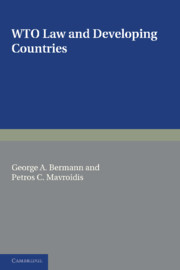Book contents
- Frontmatter
- Contents
- Contributors
- Developing Countries in the WTO System
- 1 The Legal Status of Special and Differential Treatment Provisions under the WTO Agreements
- 2 Trade Preferences to Small Developing Countries and the Welfare Costs of Lost Multilateral Liberalization
- 3 China in the WTO 2006: “Law and Its Limitations” in the Context of TRIPS
- 4 Developing Countries in the WTO Services Negotiations: Doing Enough?
- 5 Developing Countries and the Protection of Intellectual Property Rights: Current Issues in the WTO
- 6 Participation of Developing Countries in the WTO – New Evidence Based on the 2003 Official Records
- 7 Developing Countries and GATT/WTO Dispute Settlement
- 8 Representing Developing Countries in WTO Dispute Settlement Proceedings
- 9 Compensation and Retaliation: A Developing Country's Perspective
- 10 A Preference for Development: The Law and Economics of GSP
- 11 The GSP Fallacy: A Critique of the Appellate Body's Ruling in the GSP Case on Legal, Economic, and Political/Systemic Grounds
- 12 Is the WTO Doing Enough for Developing Countries?
- Index
8 - Representing Developing Countries in WTO Dispute Settlement Proceedings
Published online by Cambridge University Press: 04 August 2010
- Frontmatter
- Contents
- Contributors
- Developing Countries in the WTO System
- 1 The Legal Status of Special and Differential Treatment Provisions under the WTO Agreements
- 2 Trade Preferences to Small Developing Countries and the Welfare Costs of Lost Multilateral Liberalization
- 3 China in the WTO 2006: “Law and Its Limitations” in the Context of TRIPS
- 4 Developing Countries in the WTO Services Negotiations: Doing Enough?
- 5 Developing Countries and the Protection of Intellectual Property Rights: Current Issues in the WTO
- 6 Participation of Developing Countries in the WTO – New Evidence Based on the 2003 Official Records
- 7 Developing Countries and GATT/WTO Dispute Settlement
- 8 Representing Developing Countries in WTO Dispute Settlement Proceedings
- 9 Compensation and Retaliation: A Developing Country's Perspective
- 10 A Preference for Development: The Law and Economics of GSP
- 11 The GSP Fallacy: A Critique of the Appellate Body's Ruling in the GSP Case on Legal, Economic, and Political/Systemic Grounds
- 12 Is the WTO Doing Enough for Developing Countries?
- Index
Summary
Introduction
This paper sets forth some thoughts based on my personal experience in representing developing countries in WTO dispute settlement proceedings. There have been many very thorough statistical studies relating to the dispute settlement system and, in particular, developing country participation. This paper is not intended to duplicate that work. Rather than trying to draw empirical conclusions from the statistics as to which developing countries have participated in the system, and the rate at which they participate, I propose instead to discuss some practical aspects of the resource constraints facing developing countries in participating in WTO dispute settlement.
Any discussion of representing developing countries in WTO dispute settlement proceedings must probably begin and end with the question of the resources available to developing countries and whether these resources enable them to participate on equal terms with developed countries. The question of resources is frequently approached simply from the point of view of developing countries' financial ability to obtain adequate legal advice. This is, of course, an important factor – perhaps the most important factor – but resource constraints are not limited simply to the ability of a developing country to retain good legal counsel. Instead, such constraints can manifest themselves in many other ways and influence every aspect of the decision of whether to participate in dispute settlement proceedings. These resource constraints condition developing countries' ability to participate in and benefit from not only the dispute settlement system but also all aspects of the WTO.
- Type
- Chapter
- Information
- WTO Law and Developing Countries , pp. 213 - 232Publisher: Cambridge University PressPrint publication year: 2007
- 1
- Cited by



